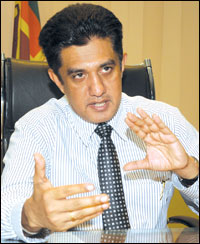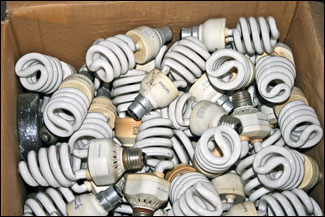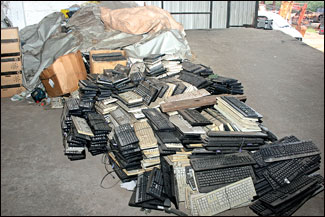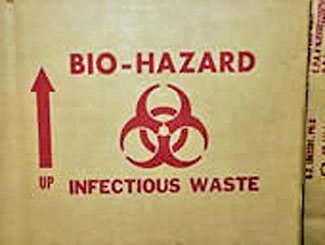|
[Sunday Observer PLUS]
Responsibility devolves on CEA:
Mitigating hazards to protect environment
By Manjula FERNANDO
|

Charitha Herath
|
Crash flooding in Colombo is a major concern for city dwellers and
authorities alike. The city goes under water with the shortest heavy
rainfall rendering people homeless and making them instant IDPs while
authorities run helter skelter to find minute solutions.
The Sunday Observer spoke to Central Environment Authority (CEA)
Chairman Charitha Herath on the role of the CEA on mitigating this
burden and the area of hazardous clinical waste management for which Sri
Lanka is still struggling to find a safe solution.
|


e-waste collected under CEA project |
Herath said “Unlike in the past wetland protection will be a
development project in the future. There will be incentives in different
forms for individuals who own wetlands and agree to protect and preserve
them for the sake of human well-being.”
The responsibility of mitigating crash flooding is mainly on the
Disaster Management Centre and the UDA. The CEA is involved in as a
stake holder in the wetlands management program. Filling of wetlands is
a major cause for crash flooding in the city.
We plan to maintain a wetland account in the future. If there is a
party protecting a wetland, such individuals will be rewarded. This is
one important component of the new wetland policy of the government.
There are several types of wetlands, which include water resources,
paddy fields and marshy lands.
Haphazard filling of wetlands under development projects has caused a
lot of harm to the environment. The development completed can be
reversed in one split second by flooding and other natural disasters.
The buildings that were constructed on filled in wetlands collapse with
floods and cause disaster.
Today we feel the need to protect our wetlands as a natural resource
more than ever before.
We plan to carry out census of all wetlands in the country shortly.
The information will be used to create a wetlands database. That way
we could identify the areas most critical to our survival and bring in
legislature to protect these areas under the law.
The National Environment Act has empowered the CEA to declare any
given environmentally important place or water resource as an
environmentally protected area. Currently we have nine such places
islandwide which include the Knuckles range, Hantana, Bolgoda Lake.
Once we finish our wetland database, we could identify new sites that
need to be declared protected areas, so that any development activity
can to be sanctioned and approved by the CEA.
For the UDA, Defence Ministry, CEA, Disaster Management Ministry and
the Disaster Management Centre managing wetlands is a common
responsibility.
The UDA and the Defence Ministry have launched a joint program to
restructure wetlands in Colombo and its suburbs as a solution to the
crash flooding in the city
We are looking at the protection of wetlands in a broader
perspective.
|

Pix by Tilak Perera |
For us this is not a mere attempt to mitigate crash flooding in the
city or a disaster management mechanism. We consider the wetlands to be
a vital natural resource and a bio diversity unit for the country.
The CEA has declared Bolgoda Lake, Thalangama Lake and the
Muthurajawela marshy lands as protected areas to prevent unlawful land
filling and development activites taking place. These areas are very
vital to drain in excess rain water and mitigate crash flooding within
Colombo and its suburbs.
We plan to declare the Benthara River, a few kilometers from sea
towards land and Gin Oya in the Wayamba Province as new environmentally
protected areas.
Unlike in the past wetland protection will be a development project
in the future. There will be incentives in different forms for
individuals who own wetlands and agree to protect and preserve them for
the sake of human well-being.
Guidelines
The CEA was established in the 1980s under the National Environmental
Act of 1981 to protect and manage the environment. It has five main
units.
The environment Management and Assessment Division where all
Environmental Impact Assessments (EIAs), for development projects
inclusive of dams and hydro power are done. This unit also covers
initial environment examinations.
The second division is Pollution Control” - where we give
environmental protection licences. A major BOI company as well as a
village level grinding mill has to confirm to certain guidelines and
they need to get an environmental protection licence (EPL).These new
enterprises must give an assurance to the CEA that the waste they will
be emmiting - the air, water and sounds - will be released to the
environment only after being purified, in a proper manner without
polluting the environment.
The First requirement is Environmental Clearance (EC). Once a project
proposal is submitted to the CEA we have to determine if the project can
proceed with an ordinary EC, or initial environmental examination or if
the project needs an advanced Environmental Impact assessment. Then
before the business venture commences activities, they need to obtain an
EPL.
The Third unit of the CEA is Natural Resource Management. The
management of wetlands and environmentally protected areas comes under
this unit.
The fourth is the Environmental Education and Awareness Division.
This unit works with students in almost all schools in the country,
developing eco clubs, giving them environment awareness programs.
The fifth one is the Waste Management Arm. Scientifically, there are
different types of waste; solid waste and hazardous waste. Hazardous
waste includes e-waste, clinical waste and chemical waste.
Pilisaru
The CEA is in charge of a national waste management project titled
Pilisaru Solid Waste Management. This was in operation for the past
three years and has been extended for another three years from 2011.
Under this project we are working with local authorities to implement
solid waste recycling activities. We do composting and bio gas plants. A
post consumer plastic and polythene recycling project is another program
currently implemented by the CEA.
Electronic waste
A very successful e-waste management project was launched in the
latter part of last year. Fourteen main private companies are working
with the CEA to collect and dispose the electronic waste.
We are also going to launch a clinical waste management project with
the Ministry of Health.
The CEA has got enough funding for other waste management projects
but for the clinical waste management the CEA is contemplating private-
public partnerships to generate funding. Some private companies are
willing to invest in incinerator plants.
Clinical waste cannot be recycled. It has to be disposed of. These
can be body parts, used syringes, saline bottles, surgical equipment,
the material carries hazardous substances.
Monopoly
At the moment a private company owns a monopoly in disposing clinical
waste. With the growing population and number of hospitals we have felt
that this area needs to be expanded and regulated. The State is going to
take over the clinical waste disposing activity with private
partnerships
The CEA has suggested six clusters of clinical waste disposing
agencies to cover the entire country.
We have already had basic discussions with both the Health and
Environment ministers and they have agreed to indepth discussions this
month to carry the process forward. CEA will be facilitating and
initiating the project.
New mechanism
We do not have a government program for this purpose. Therefore, we
have had instances where some hospitals dispose hazardous waste along
with the municipal waste. This is extremely dangerous. There can be a
lot of disease contacting material and contaminated equipment in the
clinical waste coming out of hospitals. Some private hospitals have the
facility to dispose clinical waste but some government hospitals don’t
have that facility.
Even in Kandy there was a common arrangement but still that does not
work.
There are many connected issues. It is not a failure of any State
agency but we as the CEA should follow up and find a viable solution.
A number of private parties are willing to help the CEA in this task.
They will be allowed to levy fees from the hospitals. State hospitals
will also have to pay for the services.
At the moment the financial allocations to get these services done,
are there. But the problem is the lack of a regulated and safe mechanism
for smooth disposal of clinical waste.
The lands to locate these incinerators will be provided by the CEA.
This is one of the proposals under discussion. Anyhow, the private
partners will have to bear the costs for incinerator plants which is
colossal.
As a gate keeper, we have a bigger role in the State’s development
and tourism promotion drive to ensure minimum harm to the environment
during the development process.
There are a number of new tourism promotion zones declared by the
Economic Dvelopment Ministry. We coloborate with investors in the zones
to help expedite environment clearance licences on a priority basis.
Environment Impact assessments will also be looked into.
The Ministry of Economic Development has mooted a ‘one stop shop’
concept to facilitate investors to obtain common approval from several
different State agencies.
We are playing a major part in this to ensure the environment side is
well looked after while doing away with unnecessary delays.
We think, that after the war the country needs positive involvement
of all the State agencies, and an agency like ours has a very important
role to play: a positive, proactive, role which we are playing at the
moment.Some investors are against the environment regulations of the
country. Take the Bolgoda Lake for instance.
The lake was declared a protected area by the CEA. This is a very
unique location close to Colombo. Many investors want to exploit the
area for the hospitality industry.
Development should go through some process, which sometimes offends
investors. But we don’t have an option. We have to preserve our
environment and heritage. It can never be over looked in the haste to
develop the country. |

